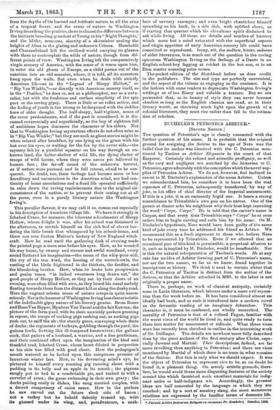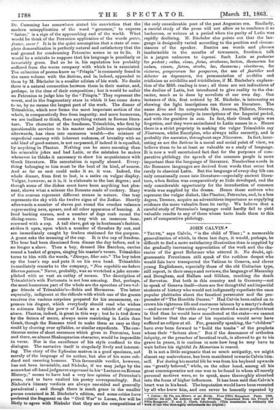BUCHELER'S PETRONIUS ARBITER* [Szconn ninon.]
THE question of Petronius's age is closely connected with the further question of his name. It is probable that the original ground for assigning the Satirae to the age of Nero was the belief that its author was identical with the C. Petronius men- tioned by Tacitus as Arbiter Ele,g Gnats in the court of that Emperor. Certainly the refined and scientific profligacy, as well as the easy and negligent wit ascribed by the historian to C. Petronius, agree admirably with the conception which the novel sup- plies of Petronius Arbiter. We do not, however, feel inclined to assent to M. Biicheler's explanation of the name Arbiter. Unless we misunderstand him, he considers it to have been the real cognomen of C. Petronius, subsequently transferred, by way of joke, to his office of chief director of the Imperial amusements. If this is a joke, it is an eminently frigid one. It bears a strong resemblance to Trimalchio's own pun on his carver. One of the guests at dinner asks his neighbour why their host kept repeating the word" Carpe, Carpe." He is told that the carver's name is Carpus, and that every time Trimalchio says" Carps" he at once orders him to begin carving and calls him by his name. On M. Blicheler's hypothesis, Nero would have been guilty of the same kind of joke every time he addressed his friend as Arbiter. We recommend this as a fresh argument to those who believe Nere to be represented by Trimalchio. Even if we allowed that an occasional pun of this kind is permissible, a perpetual allusion to it, such as is implied by M. Biicheler, would be insufferable. Nor is this the natural interpretation of Tacitus's words. He at any rate has no idea of Arbiter forming part of C. Petronius's name, nor are the two names, so far as we know, found together in inscriptions or history. We think it next to certain either that the C. Petronius of Tacitus is distinct from the author of the Satirae, or that the Arbiter attached in MSS. to the latter is not originally a proper name.
There is, perhaps, no work of classical antiquity, certainly none in Latin literature, which labours under a more evil reputa- tion than the work before us. It has been considered almost an ideally bad book, and as such is introduced into a modern novel as the favourite reading of an imaginary debauchee. This character is, it must be confessed, not wholly unmerited. The morality of Petronius is that of a refined Pagan, familiar with the worst vices of the world he lived in, and quite ready to turn them into matter for amusement or ridicule. What those vices- were has recently been sketched in outline in the interesting work of Dr. Dollinger. The details are nowhere more fully described than by the great authors of the first century after Christ, espe- cially Juvenal and Martial. Their descriptions, indeed, are far more revolting than anything in Petronius ; and there are vices mentioned by Martial of which there is no trace in what remains- of the Satirae. But this is only what we should expect. It was the object of Petronius to represent vies to be, as no doubt he- found it, a pleasant thing. On merely artistic grounds, there- fore, he would avoid those more disgusting features of the society around him which furnished such excellent materials for indig- nant satire or half-indignant wit. Accordingly, the grossest ideas are half concealed by the language in which they are couched ; and by a sort of amatory slang, the most monstrous relations are expressed by the familiar terms of domestic life.
* Parana Arbari &airman Reaqurne ex rgentione Pr. Amebae,* Beroani,180. Dr. Cumming has somewhere stated his conviction that the modern misapplication of the word "governor," to express "father," is a sign of the approaching end of the world. What would he think of the Petronian application of the words pater, frater, soror ? It is in the quiet assumption that a state of com- plete demoralization is perfectly natural and satisfactory that the real ground for condemning Petronius seems to us to lie. It would be a mistake to suppose that his language is peculiarly or invariably gross. Bad as he is, his reputation has probably suffered from the worse company with which be is associated. The collection of poems know as "Priapia" is commonly found in the same volume with the Satirae, and is, indeed, appended to them by M. Bacheler in a smaller edition of his work. No doubt there is a natural connection between them in their matter, and, perhaps, in the time of their composition ; but it would be unfair on Petronius to judge him by the" Priapia." They represent the worst, and in the fragmentary state in which it has come down to us, by no means the largest part of the work. The dinner of Trimalchio, which now forms the most important section of the whole, is comparatively free from impurity, and more humorous, we are inclined to think, than anything extant in Roman litera- ture. The character of the freedman, Trimalchio, who first by questionable services to his master and judicious speculations afterwards, has risen into enormous wealth—the mixture of superficial courtesy with inherent rudeness, of brutality with an odd kind of good-nature, is not surpassed, if indeed it is equalled, by anything in Plautus. Nothing can be more amusing than his miserable jokes and bad Latin, or the mistakes be makes whenever he thinks it necessary to show his acquaintance with Greek literature. His ostentation is equally absurd. Every- thing belonging to him must be the best of its kind, of course. And as far as cost could make it so, it was. Indeed, the whole dinner, from first to last, is a satire on vulgar display. Vulgar, however, as it is, it is elaborate to the last degree ; and though some of the dishes must have been anything but plea- sant, shows what a science the Romans made of cookery. Many of the courses represent different scenes in nature. One tray represents the sky with the twelve signs of the Zodiac. Shortly afterwards a number of slaves put round the couches valances representing nets, spears, and all other apparatus of hunting. A loud barking ensues, and a number of dogs rush round the dining-room. Then comes a tray with an immense boar, crowned with a cap. A tall slave, got up in huntsman's fashion, strikes it open, upon which a number of thrushes fly out, and are immediately caught by fowlers stationed for the purpose. A guest asks the meaning of the cap. It is the cap of freedom. The boar had been dismissed from dinner the day before, and is no longer a slave. Then a boy, dressed like Bacchus, carries round a basket of grapes, singing his master's verses. Trimalchio turns to him with the words, "Dionyse, liber esto." The boy takes up the boar's cap and puts it on his own head. Trimalchio immediately remarks to the company, "Non negabitis me habere liberum patrem." Never, probably, was so wretched a joke a,ccom- 'dished with so vast an outlay of means. The description of Trimalchio's wife Fortunate is not less amusing. But, perhaps, the most humorous part of the whole are the speeches of two vul- gar friends of Tiimalchio's--Schia and Hermeros. The latter especially, indignant at the ridicule with which one of the guests receives the various surprises prepared for his amusement, ex- presses his disgust, which everybody should read who wishes to estimate fully the pow9r of Latin as a vehicle of vigorous abuse. Plautus, indeed, is great in this way ; but he is tied down by the fetters of metre, always more restricting in Latin than Greek, though the Romans tried to make them as easy as they could by slurring over syllables, or similar expedients. The con- tinuous series of short sentences which gives to Petronius, here and there, an almost Shakespearian character, would be impossible in verse. Nor is the excellence of his style confined to the dialogue. The narrative itself is singularly lively and interest- ing. The story of the Ephesian matron is a good specimen, not merely of the language of its author, but also of his more sub- dued and sneering humour. This favourable verdict, however, has not been invariable, and Niebuhr, if we may judge by the somewhat off-hand judgment expressed in his "Lectures on Roman History," seems to have had a very low opinion of Petronius's prose, and to have exalted his poetry correspondingly. But Niebuhr's literary verdicts are always one-sided and generally paradoxical ; and though there is much grace in the smaller poems contained in M. Biicheler's edition, and some critics have preferred the fragment on the "Civil War" to Lucan, few will be likely to agree with Niebuhr that they are the compositions of the only considerable poet of the past Augustan era. Similarly, a careful study of the prose will not allow us to condemn it as barbarous, or written at a period when the purity of Latin was rapidly declining. M. Blicheler also points out that the lan- guage is designedly varied according to the position and circum- stances of the speaker. Rustics use words and phrases inadmissible in the mouths of townsmen, freedmen talk in a jargon unknown to ingenui. Such Latin as pudeatur for pudeat ; coelus, vinus, fetus, strabonus, lactem, thesaurum for cesium, vinurn, fat mu, strabo, lac, thesaurus ; vinciturus, for victurus, pauperorum for pauperism, the use of fastidier and delecter as deponents, the pronunciation of scriblita and triclinium as sciribilita and trichilinium, if M. Biicheler's explana- tion of the MSS. reading is true ; all these are not indications of the decline of Latin, but introduced to give reality to the cha- racter, much as is done by novelists of our own day. One instance of this, first noticed by M. Biicheler, is interesting as showing the light inscriptions can throw on literature. The name Eros and its compounds like, Anteros, Phileros, Niceros, Syneros, occur frequently in inscriptions of the Imperial period, and with the genitive in onis. In fact, their Greek origin was forgotten, and they were assimilated to Latin names in o. Hence there is a strict propriety in making the vulgar Trim alchio say Niceronem, whilst Encolpius, who always talks correctly, and is probably the narrator, throughout says Nicerotem. In fact, inter- esting as are the Satirae in a moral and social point of view, we believe them to be at least as valuable as a study of language. It is now a well ascertained fact that for the purposes of com- parative philology the speech of the common people is more important than the language of literature. Numberless words in the Romance languages are derived from words that occur but rarely in classical Latin. But the language of every-day life can only occasionally come into literature—especially ancient litera- ture, when fiction was comparatively so little developed, and the only considerable opportunity for the introduction of common words was supplied by the drama. Hence those authors who represent the vulgar dialect, like Plautus, Petronius, and, in a less degree, Terence, acquire an adventitious importance as supplying evidence the more valuable from its rarity. We believe that a careful study of Petronius's language could hardly fail to yield valuable results to any of those whose taste leads them to this part of comparative philology.































 Previous page
Previous page